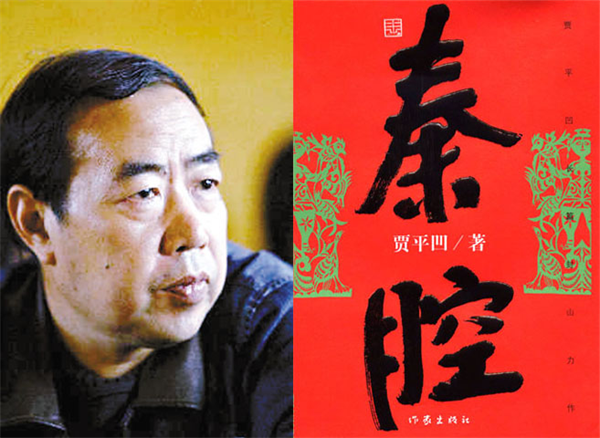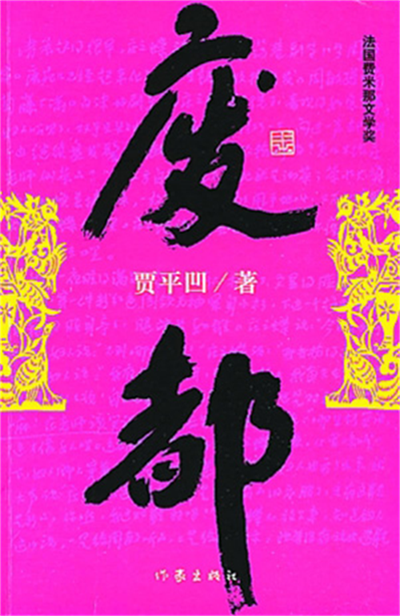Jia Pingwa

Jia Pingwa is one of China's most popular authors of novels, short stories, poetry, and non-fiction. He was born in 1952 in Dihua Village, Danfeng County, Shangluo Special Administrative Region (present-day Shangluo City), Shaanxi, later graduating from Northwest University in Xi'an. His most well-known novels include Ruined City, which was banned by the State Publishing Administration for over 17 years for its explicit sexual content, and Qin Opera, winner of the 2009 Mao Dun Literature Prize.
Early life and teen years
Born only three years after the founding of the People's Republic of China, as the son of a school teacher, Jia Yanchun (贾彦春), Jia had an early role model for his later decision to become a writer. Due to a shortage of qualified teachers in Shaanxi at the time, however, Jia's father was often away from home and so he spent much of his early childhood with his mother, Zhou Xiao'e (周小鹅). With the advent of the Cultural Revolution in 1966, Jia Yanchun was accused of being a counter-revolutionary and he spent the next ten years in a labor camp. Three years later, with the closing of all schools in China following the excesses of the Red Guards, Jia was dispatched with his classmates to build reservoirs in the countryside.
Education and early career
While working on the production brigade, Jia had the good fortune to attract the attention of local party cadres after volunteering to write revolutionary slogans, and thanks to their support he was sent to study literature at Northwest University in Xi'an in 1971. Two years later, Jia's first short story, "A Pair of Socks", appeared in The Xi'an Daily, and was soon followed by many others. After graduating in 1975 Jia found employment at Shaanxi People's Publishing House editing the monthly magazine Chang’an, and in 1978 his short story "Full Moon" won a national award from the China Writers Association. These early were collected in Soldier Boy and Morning Songs. Like many stories published during this period (but quite different from his later work), Jia's early stories feature brave young men and women committed to the cause of Chinese socialism.
Turn towards native-place fiction
Inspired perhaps by the worsening health of his father, who had fallen into alcoholism, in 1980 Jia published his first collection of rural fiction set in his home province of Shaanxi, Notes from the Highlands, and in 1982, on the strength of his published short stories and essays, Jia was admitted by the Xi'an Literary Federation, allowing him to pursue writing full-time. Although he found himself under greater scrutiny, even becoming a target of criticism during the Anti-Spiritual Pollution Campaign of late 1983, Jia's sketches of everyday life in Shangzhou (the traditional name for his native region) were published to greater and greater success, with the novellas First Records of Shangzhou, Further Records of Shangzhou and More Records of Shangzhou appearing between 1983 and 1986.
In 1986, Jia published his first novel, Shangzhou, an account of a young fugitive who the police who suspect of having committed a robbery in the city. He decides to hide out in his rural hometown, giving Jia a narrative framework around which to structure his popular descriptions of life in the countryside. This novel was quickly followed by two more: Turbulence in 1987 and Pregnancy in 1988. This flurry of activity was interrupted by the death of Jia's father in 1989. Grief would compel Jia to take a more introspective tone with his next project, conceived as a semi-autobiographical account of a morally depraved author from the countryside who has been corrupted by fame. In the 1993 novel Ruined City, frank depictions of various sexual acts (drawing comparisons to the Ming dynasty vernacular classic the Jin Ping Mei) earned the book both a wide audience and a 17-year ban from the authorities, causing it to become one of the most pirated books in modern Chinese literature.

After Ruined City and present day
Despite the ban, Jia continued to write, publishing a trilogy of rural novels: White Nights (1995), Earth Gate (1996), and Old Gao Village (1998). This was followed by the modern fable Wolves of Yesterday (2000), about a Wu Song-like hunter chasing a modern-day environmentalist who turns into a wolf, a historical romance and counter-history Heath Report (2002), and Qin Opera (2005), a challenging work incorporating elements of local Shaanxi operas which earned him the 2008 Mao Dun Literature Award. Over the last decade, Jia has completed five additional novels: Happy (2007), Old Kiln (2011), The Lantern Bearer (2013), Lao Sheng (2014), and Jihua (2016).
In 1992 Jia was admitted to the prestigious Chinese Writers Association, later being elected Chairman of Shaanxi branch of the organization and in 2003 he was appointed dean of the School of Humanities and the Dean of the College of Arts at Xi'an University of Architecture and Technology. Additionally, he is a member of the National Committee of the Chinese People's Political Consultative Conference and Xi'an People's Congress, a member of the Presidium of the Chinese Writers' Association, the Xi'an Literary Federation President, an honorary chairman of the Xi'an Writers' Association, the editor-in-chief of the literary journal Essay《美文》, and writer-in-residence at the Ocean University of China.
Style
Jia Pingwa is known for mixing traditional vernacular story-telling with modern realism in his work, which Carlos Rojas describes as being "explicitly rooted in the breathless modernization of contemporary urban China, while at the same time, a nostalgic fascination with the historical tradition which that same modernization process simultaneously threatens to erase."


